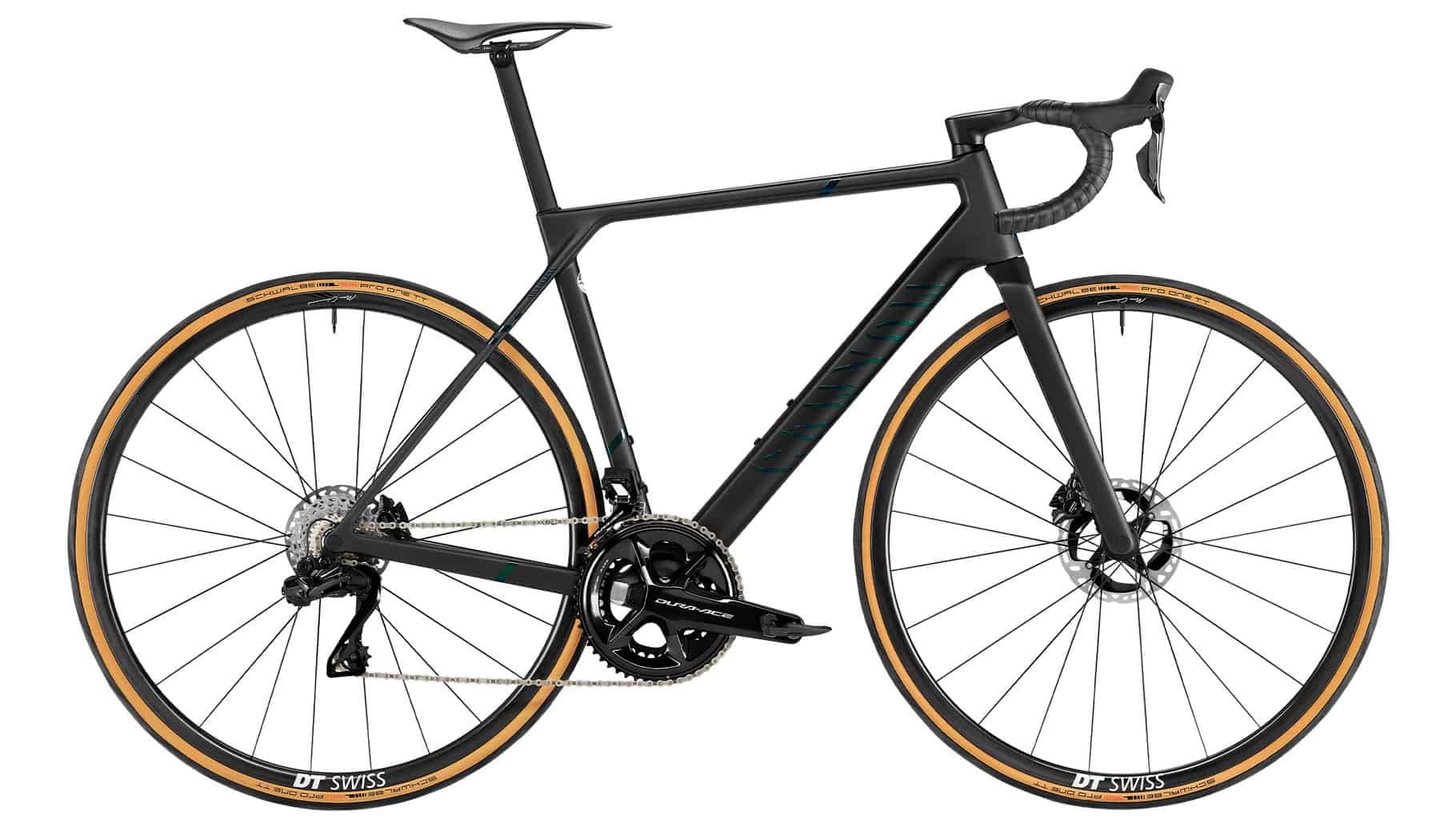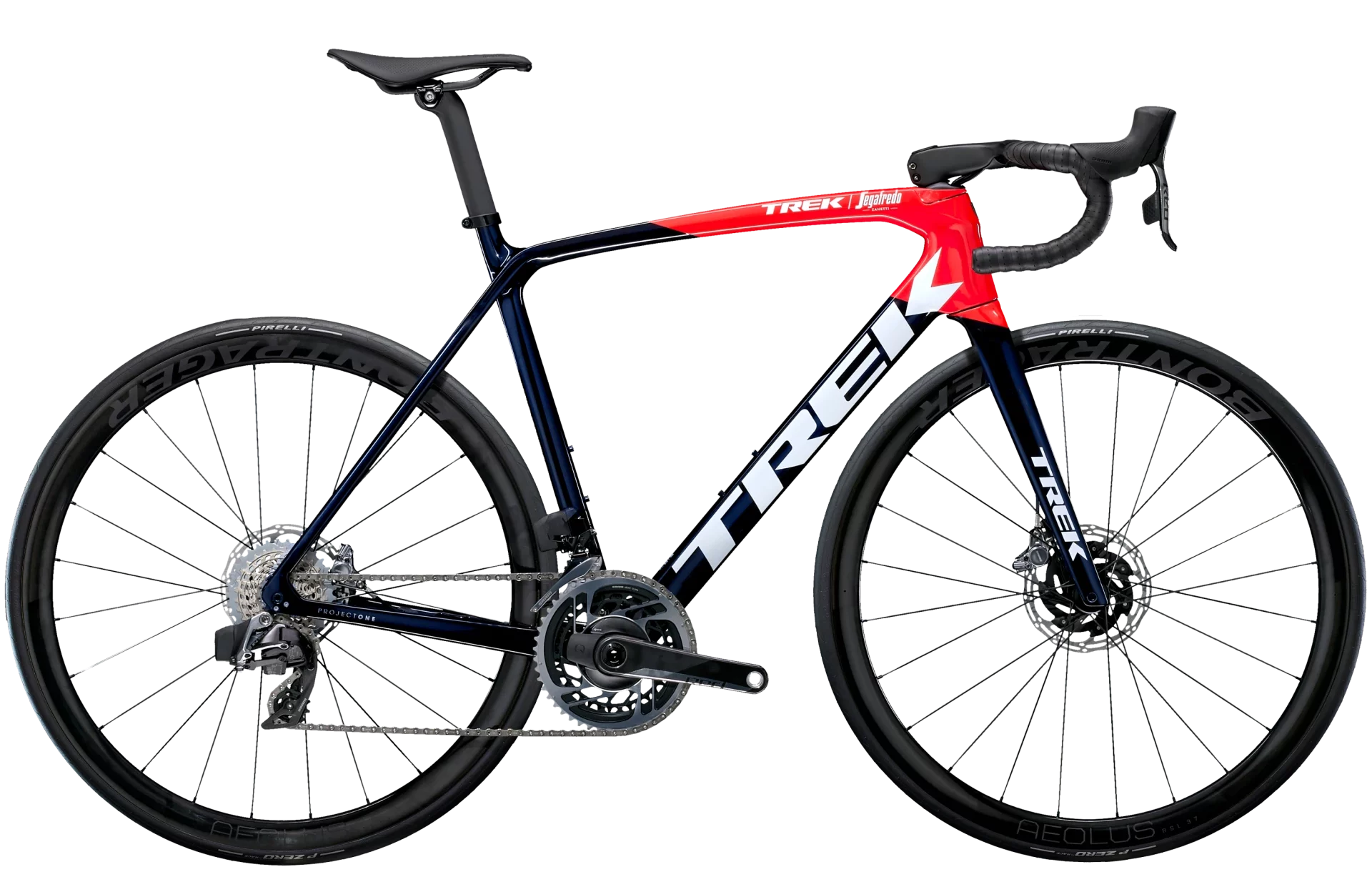In this article, I’ll guide you through a comparison between the Canyon Ultimate and Trek Emonda; both popular road bikes among cyclists.
I’ll walk through the Canyon Ultimate and Trek Emonda models lineup, their specifications, and retail pricing (USD). I’ll explain the carbon fiber technology used (Canyon Carbon Fiber vs Trek OCLV), and unique frameset features for each bike.
The goal is to help you get a better understanding before you make your final purchasing decision.
| Canyon Ultimate | Trek Emonda | |
|---|---|---|
| Type of bike | All-rounder | All-rounder |
| Frame material | CFR carbon CF SLX carbon CF SL carbon | OCLV 800 carbon OCLV 500 carbon |
| Frame sizes | XXS, XS, S, M, L, XL, XXL | 47, 50, 52, 54, 56, 58, 60, 62 |
| Groupset | Shimano, SRAM (12-speed) | Shimano, SRAM (12-speed) |
| Brakes | Hydraulic disc | Hydraulic disc |
| Price (USD) | $3,999 to $9,999 | $4,999 to $13,199 |
Canyon Ultimate

The Canyon Ultimate is an all-rounder bike. Canyon claims that the Ultimate has an unrivaled stiffness-to-weight ratio, debunking the myth that a lightweight bike is not stiff enough to perform at the highest levels of cycling.
It’s the bike the pros rode to two World Championships and three Grand Tours wins in recent years with Alejandro Valverde, Nairo Quintana, and Richard Carapaz.
The flagship model, Canyon Ultimate CFR is the latest addition with the lightest setup weighing 6.52kg. The Ultimate CFR has the best electronic shifting groupsets from SRAM or Shimano. Next in line is the CF SLX weighing 6.98kg, and CF at 7.6kg.
| Model | Frame material | Groupset | Wheelset | Retail price (USD) |
|---|---|---|---|---|
| Canyon Ultimate CFR eTap | CFR carbon | SRAM Red eTap AXS | Zipp 353 NSW | $9,999 |
| Canyon Ultimate CFR Di2 | CFR carbon | Shimano Dura-Ace Di2 | DT Swiss PRC 1100 | $9,499 |
| Canyon Ultimate CF SLX 9 Di2 | CF SLX carbon | Shimano Dura-Ace Di2 | DT Swiss ARC 1100 | $6,999 |
| Canyon Ultimate CF SLX 8 Di2 | CF SLX carbon | Shimano Ultegra Di2 (R9200) | DT Swiss ARC 1400 | $5,499 |
| Canyon Ultimate CF SL 7 | CF SL carbon | SRAM Rival eTap AXS | DT Swiss P 1800 | $3,999 |
Canyon Ultimate vs others
Trek Emonda

The Trek Emonda is a lightweight bike for the high mountains.
The lightest Trek Emonda frame weighs less than 700g using Trek’s OCLV 800 carbon. This is the bike Richie Porte rode to his third place in the 2020 Tour de France.
The SLR is the lightest and most expensive atop the Trek Emonda models. There are six Emonda SLR options, specced electronic shifting groupsets from SRAM or Shimano.
Next in line is the SL, the mid-range, more budget-friendly option. It has the same frame design and geometry as the SLR but uses the OCLV 500 carbon instead. The groupset choices are Shimano Ultegra Di2, Shimano 105 Di2, SRAM Force AXS, or SRAM Rival AXS.
The Trek Emonda SLR and SL framesets are also available separately.
| Model | Frame material | Groupset | Wheelset | Retail price (USD) |
|---|---|---|---|---|
| Trek Emonda SLR 9 AXS | OCLV 800 carbon | SRAM Red eTap AXS | Bontrager Aeolus RSL 37 | $13,199 |
| Trek Emonda SLR 9 | OCLV 800 carbon | Shimano Dura-Ace Di2 (R9200) | Bontrager Aeolus RSL 37 | $12,749 |
| Trek Emonda SLR 7 AXS | OCLV 800 carbon | SRAM Force eTap AXS | Bontrager Aeolus Pro 37 | $9,699 |
| Trek Emonda SLR 7 | OCLV 800 carbon | Shimano Ultegra Di2 (R8100) | Bontrager Aeolus Pro 37 | $8,999 |
| Trek Emonda SLR 6 AXS | OCLV 800 carbon | SRAM Rival eTap AXS | Bontrager Aeolus Pro 37 | $8,399 |
| Trek Emonda SLR 6 | OCLV 800 carbon | Shimano 105 Di2 (R7100) | Bontrager Aeolus Pro 37 | $7,699 |
| Trek Emonda SL 7 AXS | OCLV 500 carbon | SRAM Force eTap AXS | Bontrager Aeolus Pro 37 | $6,699 |
| Trek Emonda SL 6 | OCLV 500 carbon | Shimano 105 Di2 (R7100) | Bontrager Aeolus Elite 35 | $4,999 |
Trek Emonda vs others
Canyon vs Trek carbon fiber
Canyon Carbon Fiber (CF)
Canyon’s innovative approach to bike design includes the utilization of advanced carbon fiber technology, resulting in performance-oriented bicycles that offer remarkable strength, reduced weight, and improved ride quality.
Canyon employs three main types of carbon fiber in their range of bikes; CFR, CF SLX, and CF SL, each offering unique benefits to cater to your needs and budgets.
- Canyon CFR (Canyon Factory Racing) Carbon is the top-tier carbon fiber used by Canyon, designed for maximum performance. Bikes built with CFR carbon are the lightest and stiffest in the Canyon line-up, favored by professional racers and serious enthusiasts alike. The CFR series represents the pinnacle of Canyon’s engineering prowess and innovation, employing state-of-the-art materials and advanced manufacturing techniques.
- Canyon CF SLX Carbon is a step below CFR, but it still offers exceptional performance characteristics. It used to be the highest-grade carbon in Canyon’s arsenal until the introduction of the CFR series. Bikes with CF SLX carbon frames provide a perfect balance of weight, stiffness, and comfort, making them highly versatile for a range of riding conditions.
- Canyon CF SL Carbon is the entry-level carbon fiber in Canyon’s range, but it still offers excellent performance. While it doesn’t quite match the extreme weight savings and stiffness of the CFR and CF SLX grades, CF SL frames are still impressively light and stiff, providing excellent performance for the value. Ideal for cyclists who desire a high-quality, performance-oriented bike without breaking the bank, the CF SL series is a testament to Canyon’s commitment to delivering value and performance.
Trek OCLV carbon
The OCLV (Optimum Compaction, Low Void) carbon is a proprietary carbon fiber manufacturing technology developed by Trek.
- Optimum Compaction refers to the heat and pressure applied during the curing process to squeeze out excess resin and ensure that the carbon layers are compacted to the optimal density.
- Low Void refers to the goal of reducing microscopic air pockets or voids that can occur in the carbon fiber and create weaknesses.
One of the key advantages of OCLV carbon is its ability to achieve an optimal balance between stiffness, strength, and weight. Trek engineers carefully tune the carbon layup and utilize varying modulus carbon fibers to create stiff frames in certain areas to maximize power transfer while maintaining compliance in other areas to enhance comfort and ride quality.
The OCLV carbon is available in 800 and 500 series.
- OCLV 800 is the highest-grade carbon fiber used by Trek. The carbon modulus is higher in OCLV 800, making it stiffer and lighter. The manufacturing process is more refined, using more advanced carbon and resins, leading to a bike frame that provides top performance levels for stiffness, weight, and strength. OCLV 800 is used in all models with SLR.
- OCLV 500 is a lower-grade carbon but still offers a high level of performance. It has a slightly lower carbon modulus, meaning it’s a bit less stiff and heavier than OCLV 800. OCLV 800 is used in all models with SL.
It’s worth noting that the different OCLV grades don’t only refer to the material itself, but also to the manufacturing techniques used to form the carbon fiber into bike frames. Higher-grade carbon requires more precise manufacturing techniques to take full advantage of its superior material properties.
Frameset technologies and innovations
Canyon Ultimate and Trek Emonda framesets incorporate advanced technologies to enhance their bikes’ performance and ride characteristics.
Here’s an overview of the technologies used in each bike model.
Canyon Ultimate
| Name | Description |
|---|---|
| CFR Carbon | Canyon Factory Racing (CFR) Carbon is the highest-grade carbon fiber used by Canyon. It’s designed for ultimate performance, with CFR carbon frames being the lightest and stiffest in Canyon’s range. This carbon is employed for the most performance-driven models in Canyon’s lineup. |
| Pro Geometry | Pro Geometry is Canyon’s design approach that tailors each bike frame’s size with specific tube dimensions and carbon layups, optimizing performance and ride characteristics for riders of different sizes. This ensures that every rider, irrespective of their size, enjoys a consistent and optimal cycling experience. |
| Adjustable Cockpit CP0018 | The Canyon Ultimate CFR and CF SLX feature the innovative Cockpit CP0018, designed for aerodynamic efficiency and versatility. With fully internal cable routing, it offers a clean look and enhanced aerodynamics. The unique wing design allows for easy bike packing, eliminating the hassle of dealing with internal routing. Its innovative width adjustment feature lets you switch between narrow, medium, and wide settings (390-430mm) using just one tool. It provides a total adjustment range of 40mm (+/- 20mm on each side), allowing you to fine-tune your fit for comfort and efficiency. CP |
| Ultimate System Complete | This design principle ensures that the Canyon Ultimate is developed as a complete system, incorporating frame, fork, seat post, stem, handlebar, and even spacers into the design process. The goal is to maximize performance and rider comfort, making the Ultimate a highly-efficient and enjoyable bike to ride. |
| Aero Testing | Canyon uses cutting-edge technologies and tools to achieve aerodynamic efficiency, including wind tunnel testing and Computational Fluid Dynamics (CFD). These tools help them simulate and analyze airflow over the bike, enabling Canyon to refine the design for optimal aerodynamics. Canyon’s rigorous testing approach ensures the Ultimate offers superior aerodynamic performance. |
Trek Emonda
| Name | Description |
|---|---|
| OCLV Carbon | Optimum Compaction, Low Void (OCLV). A carbon fiber technology used in Trek frames. Employs advanced layup techniques and precise carbon compaction to create lightweight, strong frames with a balanced blend of stiffness and compliance. Available in two grades; OCLV 800 and 500. A higher number indicates a higher grade carbon. |
| H1.5 geometry | Trek’s geometry design that strikes a balance between aggressive racing positioning (H1) and rider comfort (H2). H1.5 geometry provides a slightly more relaxed riding position than the racier H1 geometry, making it suitable for a wider range of riders. |
| Project One | Trek’s customization program allows riders to create personalized and unique bikes. With Project One, riders can customize various aspects of their bikes, including frame color, paint scheme, components, drivetrain, wheels, and other details. |
Where to buy
Canyon shops
- Canyon online shop. Available to ship to most countries worldwide.
Trek shops
- Trek online shops. Australia, Austria, Canada, Germany, Netherlands, United Kingdom, United States
- Trek retailers. Use this tool to find your nearest Trek retailers.

Bernard Lu has 7+ years of experience working in a bicycle shop, overseeing the retail and workshop operations. He’s a qualified bicycle mechanic who understands a cyclist’s needs and speaks the same cycling lingo.
If you meet him at the cafe, he will happily talk to you for hours about all the intricacies of bikes and cycling tech. Just buy him a coffee next time you see him.